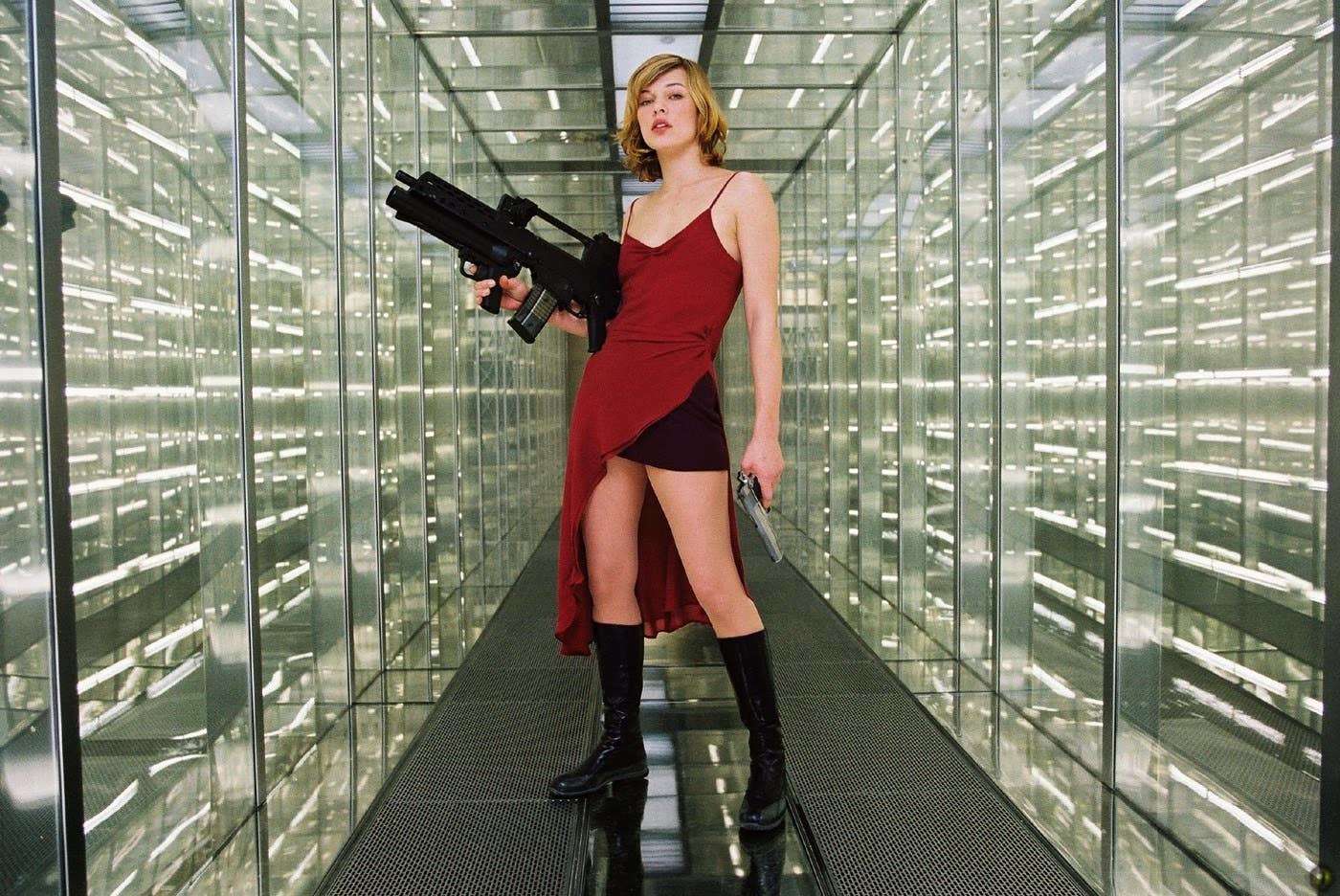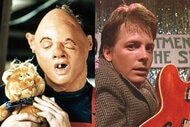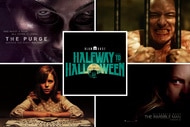Create a free profile to get unlimited access to exclusive videos, sweepstakes, and more!
20 years ago, 'Resident Evil' launched the biggest franchise you probably take for granted
As one of the most popular video game movie adaptations turns 20 this year, we're celebrating the most under-appreciated movie franchise.

When we think of movie franchises, we tend to focus on the monster blockbusters — the ones that cost upward of $250 million and bring in around a billion dollars. But there’s a world outside of Pixar, the Marvel Cinematic Universe, the DC Extended Universe, Star Wars, the Fast and Furious films, and those other behemoths. In that world, Resident Evil is fairly major.
Over the span of six films in 15 years, the franchise, based on a popular video game series, has grossed $1.2 billion — not bad for movies that are usually only budgeted at around $60 million. It all got started with the first installment, Resident Evil, which hit theaters 20 years ago today on March 15, 2002. The film starred Milla Jovovich as Alice, who wakes up on the floor of a shower, not sure where she is or what’s going on. She quickly finds herself joining a special forces team that is journeying deep underground to infiltrate the Hive, a corporate facility that’s doing all types of genetic experiments — one of which has gone haywire, turning the compound’s scientists into zombies.
At first, Alice is just along for the ride — badass soldiers like Rain (Michelle Rodriguez) seem far more equipped for this life-or-death mission than she is — but when confronted, Alice discovers she has lightning-quick reflexes and an incredible ability to deliver devastating martial arts kicks. Whoever Alice used to be, apparently she was a bit of a badass herself.
Part zombie action-thriller, part dystopian drama, part mystery — what are these strange flashbacks Alice keeps experiencing? — Resident Evil got terrible reviews and was hardly a theatrical smash. But if you were to write a book about this century’s most enduring cinematic properties, Alice’s adventures would deserve their own chapter, especially when you consider all the video game adaptations that sputtered out after one movie.
That would not be the fate of the Resident Evil series. Grim, grimy, wonderfully claustrophobic, and paying homage to sci-fi flicks, horror films, and B-movies of yesteryear, Resident Evil proudly created its own niche of R-rated shoot-'em-ups.
Not that there wasn’t pressure.
As director Paul W.S. Anderson put it at the time, “The main problem is that you have a very strong core audience who expect a lot from a movie like this. Resident Evil is their favorite game and they've been playing it for seven or eight years, and now some a**hole filmmaker is going to come along and mess it all up and ruin it. That tends to be what they're scared of.”
Which is ironic considering that, since the game’s inception, being scared was entirely the idea.
As video games became a bigger and bigger business in the 1990s, Hollywood wanted to capitalize on their success by turning beloved properties into movies. The problem was that, almost without exception, those adaptations were unspeakably terrible, resulting in disasters like Super Mario Bros., Street Fighter, and Mortal Kombat. That latter film was directed by Anderson, and although it didn’t make many critics’ Top 10 lists, it was a big hit, helping to launch the British director’s American career. Soon, he was eyeing another video game: Resident Evil, which was created by Japanese designers Shinji Mikami and Tokuro Fujiwara in 1996.
In the game, an evil company, the Umbrella Corporation, unwittingly unleashes different monsters that you have to kill. Legend has it that Fujiwara tapped Mikami for the job specifically because, although Mikami was a horror fan, he didn’t like being scared. “If he’d answered that he never got scared, I couldn’t have trusted him with the project,” Fujiwara said. “People who aren’t afraid of anything don’t understand what’s frightening. In my view, you can’t make a horror game if you don’t have any fear.”
Anderson saw the potential for a movie in the game series, which included Resident Evil 2 and Resident Evil 3: Nemesis. “I'm a gamer, and I became obsessed with Resident Evil,” he told The Hollywood Reporter in 2017. “I played the first two games back to back. It took me like ten days. I disappeared from view. Stayed in my apartment. Didn't return anyone's calls. After ten days, I emerged with ten days' worth of stubble and kind of bloodshot eyes going, ‘I love this! We have to turn it into a movie.’"
But who would play Alice?
Jovovich was an inspired, if not exactly obvious, choice. The former model (and avid gamer herself) had been acting for more than a decade, garnering attention in 1992’s Chaplin and the following year’s Dazed and Confused before transitioning to the sci-fi adventure The Fifth Element and the historical epic The Messenger: The Story of Joan of Arc, both of which were directed by her former husband Luc Besson.
“In Fifth Element, everyone expected Bruce Willis to be the star of the movie,” she said a few years ago. “Because that’s just how things were back then. Nobody thought that there would be this little orange-haired girl doing all of the crazy stuff. Back then, it definitely wasn’t the done thing. And, to be honest, it still isn’t.”
The video games didn’t feature an Alice character, which was an invention of Anderson, who also wrote the screenplay. “Paul had always been fascinated by Alice in Wonderland, and so he was very inspired by that,” the film’s producer Jeremy Bolt recalled in Inverse’s oral history of the Resident Evil franchise. “He always felt that you have to give the gamers something new. You have to respect what they love but try to give them something fresh and new, and that’s why he created this new character.”
Still, it was nervy to make the main character a woman at a time when action heroes were still principally men. Granted, 2001’s Lara Croft: Tomb Raider proved that female-driven video game adaptations could do well, but everybody knew Lara Croft. Clearly indebted to Alien, Anderson envisioned Alice as a Ripley-like figure who’s thrust into a leadership role as the soldiers around her are taken out by zombies.
Jovovich was joined by Rodriguez, who had earned acclaim in the 2000 indie Girlfight and was part of The Fast and the Furious. Initially, Anderson beefed up Rodriguez’s part because her star was in ascendance. (“It pretty much made my character 'the girl,' and Rain was 'the guy,'” Jovovich later said. “She got all of my big action scenes, and she became like Alice. And then Alice became this tag-along.”) Jovovich convinced Anderson to let her character be the lead, with Rodriguez serving as a formidable sidekick.
But beyond having a female protagonist, there was another risk involved in making Resident Evil.
“There was the question as to whether people wanted to see zombies or not,” Anderson said, “because no one had made a zombie movie in 15 years.” This was before 28 Days Later, Shaun of the Dead, and the Dawn of the Dead remake helped revitalize the genre, so a movie populated by legions of the walking dead was no sure thing at that point. (In fact, at an early stage in the film’s development, the master of zombie horror, George A. Romero, was supposed to make Resident Evil until the producers decided to go in another direction. Or, as executive producer Yoshiki Okamoto put it bluntly, “His script wasn’t good… So Romero was fired.”)
Only costing about $33 million — by comparison, that year’s Men in Black II’s budget was $140 million — Resident Evil didn’t need to be a phenomenon to earn back its money. But Rodriguez, whose character dies in Resident Evil but returns as a clone in 2012’s Resident Evil: Retribution, understood the franchise’s appeal.
“I think it's that people love destroying mankind, for some strange reason,” she said around Retribution’s release. “You make a movie about mankind's destruction, you're going to fill those seats. People just love the idea.”
Resident Evil was released at the time as counter-programming to the surefire family film hit Ice Age. It landed at No. 2 on its opening weekend but started to tumble quickly. (In its second weekend, the film was dwarfed by the debut of Blade II.) All told, Resident Evil earned about $40 million in the U.S. and an additional $63 million overseas. Not a bad haul for such a relatively low-budget horror movie — albeit one whose ending teased the possibility of sequels. (When Alice returns to the surface, she discovers that the world has been overrun by zombies. Her fight is far from over.)
Critics loathed the film. Roger Ebert gave it one star. Stephanie Zacharek declared, “Resident Evil is mildly grisly, assaultively noisy, and tremendously boring. It's action-packed in the most mindless and mechanical way.”
That didn’t keep Sony’s genre label Screen Gems from making more installments, with Anderson writing the screenplays and other filmmakers taking the reins. Those first two sequels, Resident Evil: Apocalypse and Resident Evil: Extinction, made more money than the original, but once Anderson got back in the directing chair for 2010’s Resident Evil: Afterlife, the franchise had its biggest hit to that point, bringing in $300 million worldwide. Remarkably, the sixth and final film, 2017’s Resident Evil: The Final Chapter was the series’ most commercially successful, grossing $314 million. The franchise never fully broke through to the wider, mainstream audience; it was always primarily for genre fans, and as the series went along, those fans stuck around and brought more into the fold, making Jovovich an action icon in the process.
“Every time we finish we are kind of just done with it, so I didn’t expect more than the first one,” she admitted around the release of The Final Chapter. “So each one that we do is always a pleasure and kind of a surprise and I am so happy and honored to be a part of this franchise.”
Where other film series often feel like lumbering entities as big and insidious as the Umbrella Corporation, the Resident Evil movies come across more as family affairs considering Jovovich and Anderson started a relationship around the making of the first film. They’ve since had three children and continue to collaborate, most recently on another video game adaptation, Monster Hunter.
Over time, Alice’s world expanded and grew more sweeping, but the elemental pleasure and terror of the original were hard to beat. Sure, you can tell Anderson didn’t have a lot of money to work with — smoke machines and flexible ductwork provide a dingy atmosphere on the cheap — but even the low-rent animation used for the Licker (that horrifying creature that hunts them down near the end of the film) is chilling because of the primitive technology. (Also, egads, those mutant dogs are trippy.) Resident Evil recycles lots of cinematic tropes — the Red Queen computer is like a more murderous HAL 9000 from 2001, and the soldiers-against-the-monsters setup is straight out of Aliens — but Anderson’s gift for gripping no-fuss action cinema remains genuinely impressive.
Ultimately, though, the film succeeds because of Jovovich. Sure, she’s forced to wear a short red dress throughout Resident Evil, but as Alice regains her memory — and fully embraces her destiny — you feel an actress coming into her own.
She was asked a few years ago if she thinks about her legacy as a pioneering action heroine.
“I don’t want to worry too much about my legacy, because I think you could drive yourself crazy thinking that way,” she says. “I’ve always been quite demanding of myself and probably too hard on myself in certain ways, so if I start thinking about my legacy, I would beat myself up too much. So, I think about doing the things that are interesting to me, and mostly just focusing on my family. If something is able to get my focus away from my family, then it’s probably worth doing. The legacy is going to happen regardless.”
That legacy will carry on without her and Anderson. Last fall, a Resident Evil prequel starring Kaya Scodelario and Robbie Amell hit theaters (to weak reviews and box office).
If that seems to be the end of the franchise, don't worry. If any movie series can come back to life, it's this one.














